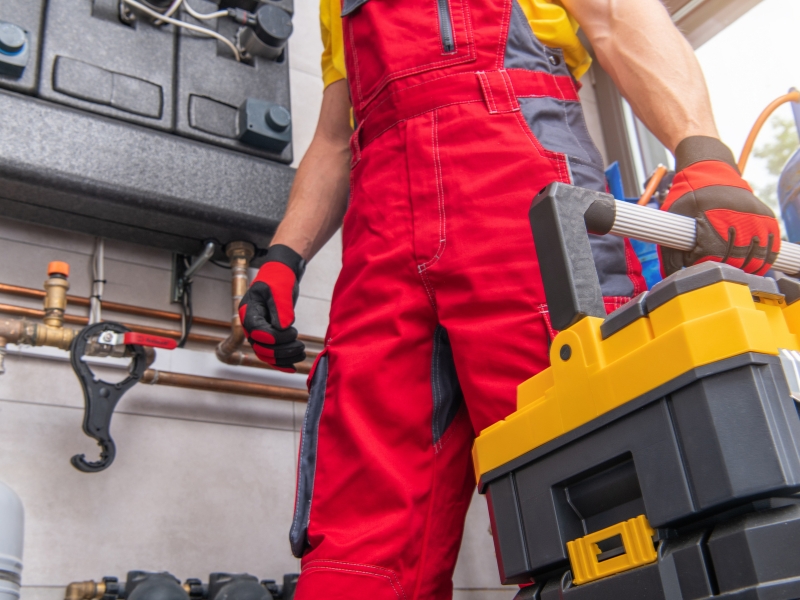Can Old Gas Pipes Be Safely Sealed Off Permanently?
A licensed professional can permanently and safely seal old gas pipes using approved techniques and materials. Whether you are decommissioning a gas appliance or renovating a property, it is crucial to ensure these pipes are sealed correctly to prevent leaks and other safety hazards. Properly sealing old gas lines provides the safety of the occupants and protects the environment by preventing the release of residual gas. This article explores sealing old gas pipes and the best methods for ensuring long-term safety and compliance.
What are old gas pipes?
Old gas pipes are obsolete or unused pipelines that once transported natural gas or liquefied petroleum gas (LPG) to various household or commercial appliances, such as stoves, heaters, and hot water systems. These pipes become redundant due to appliance upgrades, transitions to electric systems, or structural renovations. Left unsealed, these pipelines can pose serious risks, including gas leaks and contamination.
Characteristics of old gas pipes:
- Material composition: Typically made from galvanised steel, copper, or polyethylene (for more recent installations).
- Age factor: Gas lines installed over 20-30 years ago are often classified as old.
- Condition: May exhibit signs of wear, such as corrosion, cracking, or structural weakening.
- Usage status: Often disconnected from active gas systems but still pose potential risks if not properly sealed.
Old gas pipes are inactive pipelines that require careful handling to mitigate safety risks and comply with Australian regulations. Understanding their composition and condition is crucial for determining the appropriate sealing method.
Why is it important to seal old gas pipes properly?
Properly sealing old gas pipes is essential to prevent gas leaks, protect property integrity, and maintain compliance with Australian safety regulations. Failure to address unused gas lines can pose significant health and safety risks. Incorrectly sealed gas pipes can allow gas to escape over time, creating an undetectable but hazardous situation.
Key reasons to seal old gas pipes:
- Prevent gas leaks: Unsealed pipes can release residual gas, increasing the risk of fire or explosion.
- Protect property and occupants: Gas leaks can cause structural damage and health risks. It is important to recognise common gas leak warning signs to prevent these dangers from escalating.
- Ensure regulatory compliance: Australian gas safety regulations require all decommissioned gas pipes to be properly sealed.
- Environmental responsibility: Sealing gas pipes prevents the release of methane, a potent greenhouse gas.
- Insurance compliance: Many insurance providers require gas systems to be safely sealed for coverage eligibility.
Properly sealing old gas pipes is vital for safety, legal compliance, and environmental sustainability. Failing to do so can lead to severe safety issues and potential legal liability.
Who should you call to seal old gas pipes?
Sealing old gas pipes requires expertise to ensure safety, compliance, and durability. It’s essential to hire reliable gas fitting experts who can perform the task correctly while adhering to safety and regulatory standards. Experienced professionals guarantee that the sealing process is done efficiently and safely, providing peace of mind.
When should you consider sealing old gas pipes?
Sealing old gas pipes is necessary under specific circumstances to prevent risks and meet regulatory obligations. Identifying the right time to seal unused gas lines ensures long-term safety and compliance. Delaying this process can result in hidden leaks, contamination, and significant repair costs.
Common scenarios for sealing old gas pipes:
- Appliance removal: When decommissioning gas-powered stoves, heaters, or water systems.
- Renovations: During structural changes where existing gas lines are no longer required.
- Energy transition: When switching from gas-powered to electric appliances.
- Vacant properties: An active gas supply is unnecessary in unused or abandoned buildings.
- System upgrades: When modernising to more efficient energy systems, leaving old gas lines redundant.
Can old gas lines be made safe without removal?
Proper sealing methods can safely secure old gas lines without full removal, offering a cost-effective and non-invasive alternative. However, potential issues with poor gas fitting can arise if the sealing is done incorrectly. Inadequate fitting or improper methods may leave gas lines prone to leaks, leading to future risks that a more thorough process could have prevented.
Methods to make old gas lines safe:
- Capping: A gas-tight cap is fitted to the pipe’s open end to prevent leaks.
- Plugging: Specialised plugs designed for gas pipes create a durable seal.
- Inert gas purging: Pipes are filled with inert gas (e.g., nitrogen) to remove residual gas.
- Pressure testing: This checks that the sealed pipes are leak-free and meet safety standards. Proper pressure test gas installation training is crucial for professionals to assess gas line integrity and ensure safety.
- Sealing compounds: Chemical compounds can be applied to create an airtight and durable seal.
Which materials are used to seal gas pipes?
The materials used to seal gas pipes must be durable, gas-tight, and compliant with safety standards. The choice of material depends on the pipe type and sealing method. Using substandard materials can lead to future leaks and safety hazards.
Common materials for sealing gas pipes:
Material | Application |
Gas-Tight Caps/Plugs | Sealing pipe ends |
PTFE Thread Seal Tape | Threaded pipe joints |
Epoxy Compounds | Long-term, high-pressure areas |
Inert Gas (Nitrogen) | Purging old gas residues
|
Is there a safe way to manage disconnected gas lines?
Managing disconnected gas lines is crucial for safety. Whether renovating, removing appliances, or selling a property, secure disconnection helps prevent leaks and fires. In addition, safety considerations for old gas appliances should be addressed when disconnecting or removing these systems. Always follow proper procedures and hire licensed professionals.
Here are some key safety measures for managing disconnected gas lines:
- Turn off the gas supply: Always ensure the main gas supply is turned off before attempting any work.
- Engage a licensed gas fitter: Only a licensed professional should disconnect, cap, or remove gas lines to ensure compliance with safety regulations.
- Check for leaks: After disconnection, perform a thorough leak test using appropriate equipment.
- Cap unused gas lines: Sealing unused gas lines prevents accidental leaks or reconnections.
- Ventilation matters: Ensure proper ventilation during and after disconnection to disperse residual gas.
- Regular inspections: Schedule periodic inspections to verify the safety of disconnected or capped gas lines.
Managing disconnected gas lines safely requires careful handling, strict adherence to safety protocols, and the expertise of a licensed gas fitter. Always prioritise professional assistance and thorough inspections to avoid risks associated with gas leaks.
Ensuring safety when sealing old gas pipes
Sealing old gas pipes is crucial to maintaining safety, legal compliance, and environmental protection. Whether removing an old appliance or transitioning to modern energy systems, proper sealing by a licensed professional is essential. Prioritising this task ensures peace of mind and long-term security for your property.
Dealing with plumbing issues can be stressful, but getting help doesn’t have to be. Learn how Eco Plumbers 24/7 can provide reliable solutions whenever you need them.


